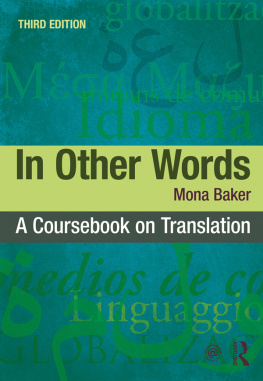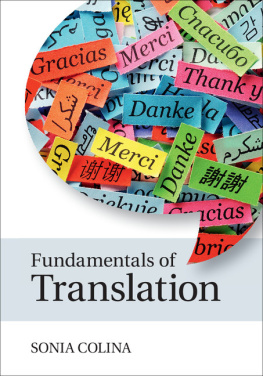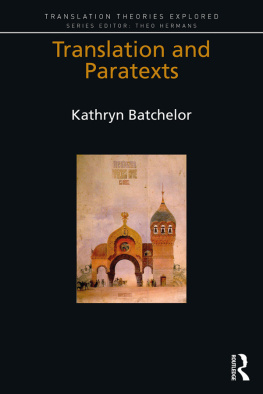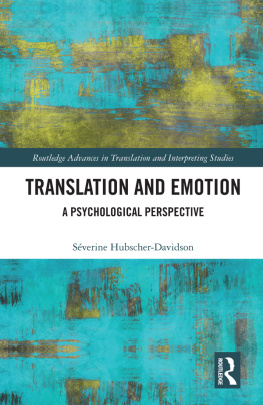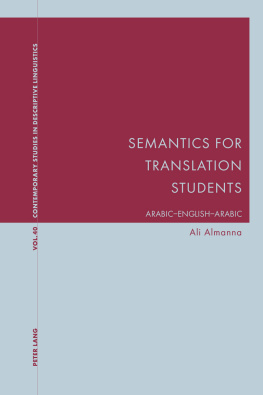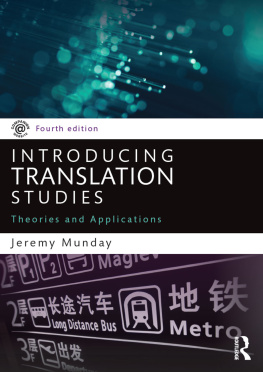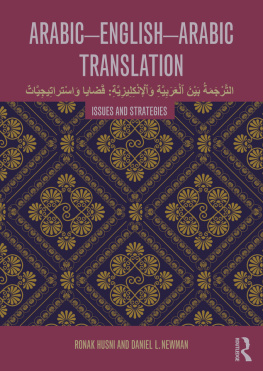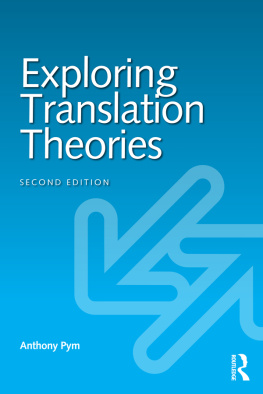Third edition published 2018
by Routledge
2 Park Square, Milton Park, Abingdon, Oxon, OX14 4RN
and by Routledge
711 Third Avenue, New York, NY 10017
Routledge is an imprint of the Taylor & Francis Group, an informa business.
2018 Mona Baker
The right of Mona Baker to be identified as author of this work has been asserted by her in accordance with sections 77 and 78 of the Copyright, Designs and Patents Act 1988.
All rights reserved. No part of this book may be reprinted or reproduced or utilized in any form or by any electronic, mechanical, or other means, now known or hereafter invented, including photocopying and recording, or in any information storage or retrieval system, without permission in writing from the publishers.
Trademark notice: Product or corporate names may be trademarks or registered trademarks and are used only for identification and explanation without intent to infringe.
First edition published by Routledge 1992
Second edition published by Routledge 2011
British Library Cataloguing-in-Publication Data
A catalogue record for this book is available from the British Library.
Library of Congress Cataloging-in-Publication Data
Names: Baker, Mona, author.
Title: In other words : a coursebook on translation / Mona Baker.
Description: Third edition. | Abingdon, Oxon ; New York, NY : Routledge, 2017. |
Includes bibliographical references and index.
Identifiers: LCCN 2017047156 | ISBN 9781138666870 (hardcover) |
ISBN 9781138666887 (softcover)
Subjects: LCSH: Translating and interpreting.
Classification: LCC P306 .B25 2017 | DDC 418/.02dc23
LC record available at https://lccn.loc.gov/2017047156
ISBN: 978-1-138-66687-0 (hbk)
ISBN: 978-1-138-66688-7 (pbk)
ISBN: 978-1-3156-1918-7 (ebk)
Typeset in Berthold Akzidenz Grotesk and Palatino
by Apex CoVantage, LLC
Visit the companion website: www.routledge.com/cw/baker

The second edition of In Other Words comes at a time of increased visibility for translators and interpreters. We only need to look at the extent of reporting on translation and interpreting in the media to appreciate how visible the profession and the activity have become. News of translation and interpreting now pervades our lives whether it is the lack of qualified court interpreters in a remote part of Australia or Canada or the fate of translators and interpreters in zones of military conflict, the launching of a national initiative to encourage translation in one region or another or the decision by the Turkish government to reinterpret Islam through a new translation of the Prophets sayings, or the impending decision by the European Commission to limit the translation of patents to three languages or the release of a feminist translation of the Bible. Every aspect of our social and political life is now heavily mediated by translators and interpreters, hence their increased visibility. Translation and interpreting are also now firmly part of the professional and academic landscape, with practically every country in the world boasting at least one association that represents the interests of the profession and numerous universities offering full-blown undergraduate and postgraduate programmes in the field. Technological advances in the past two decades have further had a major impact on the profession, resolving old challenges and raising new ones. I have tried to take stock of at least some of these developments in the choice of additional examples and exercises in this new edition. A new chapter on ethics attempts to respond to increased pressures on translators and interpreters to demonstrate accountability and awareness of the tremendous social and political impact of their decisions.
Since the publication of the first edition of In Other Words , fortune has continued to favour me with exceptionally gifted and supportive colleagues, students and family, whose input into this new edition must be acknowledged. I am grateful to my niece, Hanan Rihan, for support in preparing the text for publication. Colleagues, students and former students at the School of Languages, Linguistics and Cultures, University of Manchester, helped me check the analysis of various examples and key in text that I could not type myself. Luis Prez-Gonzlez and James St. Andr helped with Spanish, French and Chinese examples and Morven Beaton-Thome with German examples. Jonathan Bunt provided extensive support with Japanese, Zhao Wenjing with Chinese and Sofia Malamatidou with Greek.
I am particularly grateful to Moira Inghilleri, Julie Bori and Sofia Garcia for their extremely helpful, critical comments on the new chapter on ethics and to Monika Bednarek and her students at the University of Sydney for critical feedback on several chapters. From Routledge, Russell George, Sophie Jacques, Nadia Seemungal, Anna Callander and Lizzie Clifford have been extremely supportive. Their help is much appreciated.
John Sinclairs departure in 2007 left a considerable vacuum in the lives of those who were fortunate enough to know him and benefit from his immense experience. This new edition of In Other Words remains as indebted to his teachings as the first one.
Mona Baker
June 2010
Aguaruna
Amuesha
Arabic
Aztec
Bahasa Indonesia
Bali
Brazilian Portuguese
British Sign Language
Bulgarian
Chinese
Croatian
Czech
Dagbani
Danish
Dumagat
Dutch
Eskimo
Fijian
Finnish
French
Georgian
German
Greek
Gujarati
Harway n12
Hebrew
Hindi
Hopi
Hungarian
Indonesian
Inuit
Irish
Italian
Japanese
Korean
Lahu
Latvian
Lithuanian
Malay
Mandarin
Mongolian
Navajo
Nilotic languages
Norwegian
Polish
Portuguese
Romanian
Russian
Sanskrit
Scandinavian languages
Serbian
Slavonic
Slovenian
Southern Paiute n4
Spanish
Swahili
Swedish
Thai
Tjolobal (Mexico)
Turkish
Vietnamese
Welsh
Wishram
Yana
Yurok
Zapotec (Mexico)
Contents
Guide
The third edition of In Other Words has benefited from the input of all those who assisted with the first and second editions, including colleagues and students whose research gave me insight into different aspects of translation that I would not have otherwise been aware of. In particular, I am grateful to Luis Prez-Gonzlez and James St. Andr for help with Spanish, French and Chinese examples; Morven Beaton-Thome for assistance with German examples; Jonathan Bunt for providing extensive support with Japanese; Zhao Wenjing for help with Chinese; Ruijie Xie, for assistance with checking Chinese and Japanese examples; and Sofia Malamatidou for her assistance with Greek. For the third edition, Henry Jones and Julie Bori helped with French examples. I am also very grateful to colleagues who wrote at different times to point out errors in the second edition, which I hope I have now eliminated: Chris Gordon, Xing-Yi and Monika Bednarek.
The new chapter I added to this edition, on semiotic equivalence, benefited from the work of many outstanding scholars, including Nicole Baumgarten, Federico Zanettin, Gillian Lathey, Keith Harvey, and others. Their indirect assistance through their published research must also be acknowledged.

